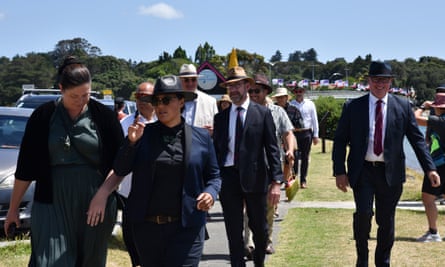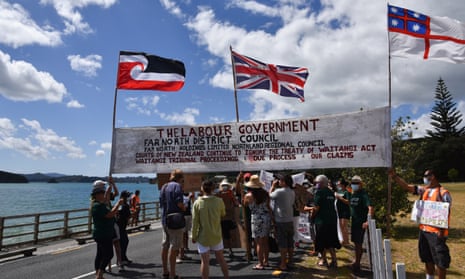Celebrations for Waitangi Day are pressing ahead, with the Labour party’s Māori caucus arriving on Tuesday afternoon, after New Zealand logged the fifth consecutive day with no new Covid-19 cases in the community.
Labour members were greeted by a small number of protesters calling on Crown institutions such as local councils and courts to better honour their Treaty of Waitangi obligations and uphold more treaty claims.
Four cases of coronavirus were reported on Tuesday but all were in managed isolation. Two were travellers from the UK, one from India and a fourth case from the US was deemed historical.
The Ministry of Health said 347 of the 349 people at the Pullman Hotel – the isolation facility closed down for investigation after three cases emerged last week – had tested negative. Results of the remaining two were awaited.
Last week the future of Waitangi 2021 was in doubt after groups including the Māori party and Māori king pulled out, citing health risks to the vulnerable Northland population should the virus be circulating following the Pullman hotel outbreak.
Despite some community concern, the government has continued with plans to attend. Waitangi Day, on 6 February, celebrates the signing of the Treaty of Waitangi between Māori tribes and British settlers in 1840.
The day has often been marred by protest, but in recent years Jacinda Ardern’s government has cultivated a peaceful atmosphere in the far north, including hosting a now-popular barbecue where the prime minister and her MPs cook breakfast for the public.
The Waitangi National Trust said extra health and hygiene measures would be in place this year.
“We will be encouraging people to practise good hygiene, to use the Covid tracing app, and to stay home if they feel unwell or uncomfortable,” said the trust chair, Pita Tipene.

Waitangi celebrations officially begin on Thursday when a pōwhiri will be held for the governor general and the prime minister, at which point Ardern will make her annual address, which usually focuses on issues of trust and cooperation between treaty partners, Māori wellbeing concerns and what plans her government has to meet its treaty obligations over the next three years.
Tipene said his team was in close contact with the Ministry of Health and following advice such as increasing the number of hand-wahsing and hand-sanitising stations, and holding all large public events outdoors.
“We will be monitoring closely any changes in advice from the Ministry of Health and have contingencies in place to adapt events should that be required,” Tipene said. “But at the moment, everything will proceed as planned and we look forward to once again welcoming everyone to Waitangi to commemorate the first signing of Te Tiriti.”
The Iwi Chairs Forum will be held online this year, a move applauded by the writer and academic Dr Rawiri Taonui, who has criticised this year’s Waitangi as being “white”, after numerous Māori groups, the Māori king and the Māori party pulled out of festivities.
Taonui wrote that Māori were disproportionately at risk from Covid, and needed to be protected as a health priority, saying: “Māori are currently 20% of all deaths from Covid-19 and were 22% of all cases in last year’s August Auckland Pacific-Māori outbreak.”
“This decision was taken to protect Māori communities in the North, kaumātua, koroua and kuia, and Māori aged over 50 years old who have a heightened risk because Māori acquire comorbidities 10 to 15 years earlier than Pākehā,” Taonui wrote in an op-ed for Waatea news.
“MPs can fly in and fly out. Their entourages are smaller. The risk to them is minimal but not the communities they visit.”
